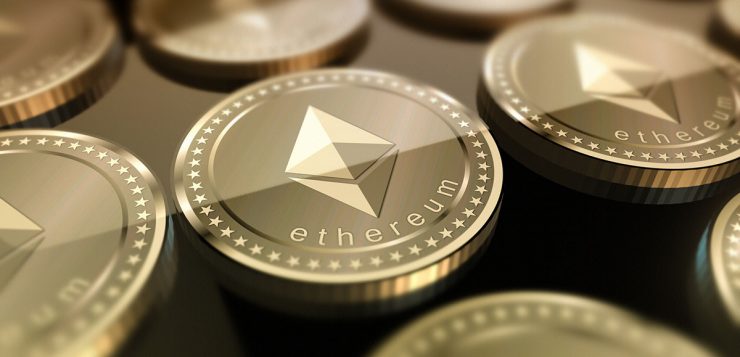Smart contracts and the Ethereum Virtual Machine make all the difference.
Despite its recent correction, the cryptocurrency market has done things that investors have simply never seen before. Over a 53-week span between the beginning of 2017 and the first week of January 2018, the aggregate value of all digital currencies exploded higher to $835 billion from $17.7 billion, working out to an increase of more than 4,500%. No single asset class has ever delivered gains like this in such a short time frame.
Why bitcoin remains the world’s most valuable cryptocurrency
Leading that charge higher has been bitcoin, the world’s most popular virtual coin and the largest cryptocurrency by market cap — a title it’s never ceded. Bitcoin’s allure comes from its first-to-market advantage (it was the first tradable cryptocurrency), as well as the fact that it’s accepted by more merchants than any other digital coin. In fact, bitcoin snagged five brand-name businesses all the way back in 2014, and has been adding more merchants ever since.
Bitcoin is also credited with bringing blockchain technology into the mainstream. Blockchain is the digital and distributed ledger that underpins virtual currencies and is responsible for logging all transactions without the need for a financial intermediary, like a bank. It’s expected to be a game changer for the financial services industry due to its ability to speed up transaction verification and settlement times, as well as lower transactions fees.
Blockchain is also anticipated to have utility well beyond the financial sector, with various tech and consumer goods companies using it to manage connected devices via the Internet of Things or to more efficiently control a merchandise supply chain.
Ethereum deserves to be at the top of the crypto mountain
However, this investor doesn’t believe bitcoin deserves its title as the world’s most valuable cryptocurrency by market cap. Yes, its first-to-market advantage has some perks, as does its brand-name among crypto enthusiasts. But bitcoin’s focus on partnering with merchants to accept its token, rather than focusing on making its blockchain more enterprise-friendly, could be its downfall. A shift in focus among cryptocurrencies has made it pretty clear to me that wrangling merchants takes a backseat in terms of long-term value creation relative to blockchain development and deployment. That’s why Ethereum, the second-largest cryptocurrency by market cap, deserves to be the most valuable digital currency.
Ethereum’s focus is entirely on blockchain development and catering to businesses that could benefit from deploying blockchain. This means it’s targeting banks that would relish cross-border transactions that complete in seconds or minutes compared to wait times of up to three to five days with the current banking system. A recent analysis from HowMuch.net found that Ethereum’s network processes about 20 transactions per second compared to bitcoin at a maximum of seven transactions per second.
It also means that Ethereum’s blockchain is being tested by tech, energy, and retail companies that could benefit from the efficiencies created by blockchain. Though bitcoin probably has a lot of merchants accepting its token as a form of payment, the Enterprise Ethereum Alliance, formed in February 2017, has 200 member organizations currently testing a version of its blockchain technology.
Ethereum’s differentiation from bitcoin is what makes it special
There are two particular aspects of Ethereum that, in my view, should push its market cap beyond that of bitcoin.
First, the integration of smart contract protocols do make a difference. Smart contract protocols help to verify, facilitate, or enforce the negotiation of a contract, and they’re particularly attractive to enterprises. The belief is that paper contracts aren’t very efficient, and they can sometimes be confusing or not legally binding. Smart contracts allow businesses to modify Ethereum’s blockchain to make it as simple or complex as they choose, and they’re legally binding. These smart contracts can function as multisignature accounts that determine when money can be spent, or they can simply be used to store information about an application.
The other factor that makes Ethereum light-years more attractive than bitcoin is that the Ethereum Virtual Machine (EVM) tends to be the basis of evolution for a number of burgeoning cryptocurrencies. Think of EVM as the environment that smart protocols operate in. For instance, Qtum combines the core infrastructure of bitcoin with EVM to allow enterprise customers the ability to fully dictate the complexity and scope of their smart contracts. Perhaps not surprisingly, Qtum landed two major Chinese partners this past week, and expects to partner with five major companies in 2018.
Something to keep in mind
However, I’d be remiss if I didn’t point out that while I believe that Ethereum deserves to be valued higher than bitcoin, that’s not in any way an endorsement that cryptocurrency valuations will head higher. Ethereum, bitcoin, and the entire crypto group have a lot to prove.
Perhaps the biggest issue relates to the emergence of blockchain technology. The buzz around blockchain is thick enough to cut with a knife, yet it’s a technology that’s technically been around for about a decade and is only now being demoed and tested in small-scale projects. Businesses are naturally moving slow with blockchain because it remains relatively unproven. In some cases, implementing blockchain would mean completely starting from scratch, suggesting it’s a cumbersome and costly venture. In other words, there’s no guarantee that these tests will result in a quick adoption of blockchain technology. History suggests that if blockchain is successful, it’ll take years to implement, which could quell the euphoria that’s currently rampant among cryptocurrencies.
The barrier to entry is also exceptionally low when it comes to blockchain development. Though I stand by my view that Ethereum is the preferred blockchain choice of enterprises, a number of big companies have ventured out to create their own proprietary blockchain technology. For example, Cisco Systems (NASDAQ:CSCO) has created a blockchain capable of monitoring connected devices and determining the trustworthiness of new devices that connect to the network. Cisco has effectively paved a way to manage the Internet of Things.
Long story short, it’s not as difficult as you might imagine for new entrants to develop blockchain, which means the perch at the top of the mountain is precarious at best for bitcoin and Ethereum.
Reda more at:
https://www.fool.com/investing/2018/01/23/ethereum-not-bitcoin-deserves-to-be-the-worlds-mos.aspx







